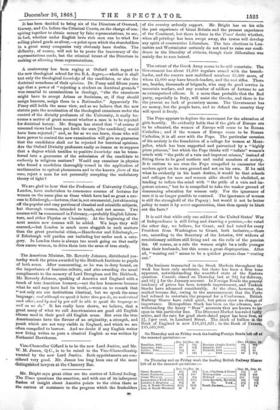A controversy has been raging at Oxford with regard to
the new theological school for the B.A. degree,—whether it shall test only the theological knowledge of the candidates, or also the doctrinal soundness of their opinions. Dr. Pusey said fifteen years ago that a power of " rejecting a student on doctrinal grounds " was essential to examinations in theology, "else the examiners might have to accept Arians or Socinians, or, if they should assign honours, assign them to a Rationalist." Apparently Dr. Pusey still holds the same view, and as we believe that the new statute puts the nomination of the theological examiners under the control of the divinity professors of the University, it really be- comes a matter of great moment whether a man is to be rejected for doctrinal heresy. Mr. Burgon has stated that " of course if unsound views had been put forth the man [the candidate] would have been rejected ;" and, as far as we can learn, those who will have power to control the new examination will give no guarantee that the candidates shall not be rejected for heretical opinions. Are the Oxford Divinity professors really so insane as to suppose that a degree which testifies to positive knowledge can be trans- ferred into a guarantee of the submission of the candidate to authority in religious matters ? Would any examiner in physics who found a candidate thoroughly versed in the application of mathematics to optical phenomena and to the known facts of the case, reject a man for not personally accepting the undulatory theory of light ?


































 Previous page
Previous page